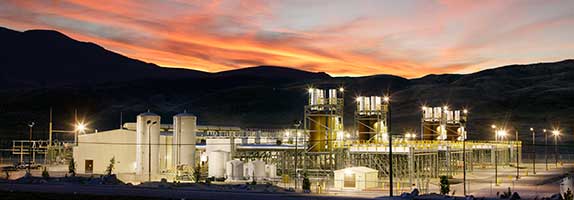

About Marine
Technology group Wärtsilä is part of a new research project exploring innovative technology for cleaner, more energy-efficient engines utilising a closed loop combustion cycle. The research will focus on the use of argon – a non-toxic ideal gas present in the atmosphere – to increase efficiency of balancing engines. The co-innovation project is run by the Integrated Hydrogen-Argon Power Cycle (iHAPC) consortium, led by the University of Vaasa, in partnership with Business Finland and a wide network of partners.
In an internal combustion engine, the energy supplied by combusting fuel is directly converted into mechanical power by the controlled combustion of the fuel in an enclosed space. In the Argon Power Cycle, air, which is normally used to combust the fuel in an internal combustion engine, is now replaced by argon and oxygen. The research focuses on scaling up the Argon Power Cycle to medium speed engines with full argon recovery. Argon enables a considerably higher thermodynamic efficiency due to its properties.
When using hydrogen, oxygen and argon as input the only product from the process is water and the inert argon. Argon is recycled from exhaust to inlet forming a closed loop combustion cycle. Hydrogen and oxygen, the only inputs in the integrated Hydrogen Argon Power Cycle, are both products of electrolysis, which increases the overall efficiency of the power-to-hydrogen-to-power process.
Rasmus Teir, Director of Sustainability & Future Plant Concepts at Wärtsilä Energy says: "We have the technologies needed to deliver a 100% renewable energy future. And our ambition must be to continuously innovate solutions that further improve affordability and sustainability. The argon power cycle is an innovative technology that has the potential to impact these factors positively.”
Balancing engines are a vital component of the transition to renewable energy systems, providing essential power to balance intermittent wind and solar power and ensure grid stability. The most efficient engines run on gas today but are ready to be converted to sustainable fuels such as hydrogen when they are available at scale. With sustainable fuel production forecast to reach 38 million tonnes by 2030 (a third more than current demand) this transition is expected to be possible within the next decade.
The three-year project is part of the WISE (Wide and Intelligent Sustainable Energy) programme, led by Wärtsilä and funded by Business Finland, the official government agency for trade, investment promotion and innovation funding. The partners of the iHAPC project are University of Vaasa, University of Oulu, VTT Technical Research Centre of Finland, Parker Hannifin Manufacturing Finland Oy, Vahterus Oy, Vaisala Oyj and TotalEnergies.
Professor Maciej Mikulski from the University of Vaasa, the responsible leader of the iHAPC project, says: “The argon power cycle enables full valorisation of green hydrogen with unparalleled power generation efficiency. I see this as a potential breakthrough for the energy sector. The University of Vaasa plays a crucial role in advancing such innovative energy solutions with a strong focus on sustainability. With our expertise in fuel analytics, modelling and simulation, powertrain testing, and control development, we are well-equipped and excited to lead this project.”
Media contact for more information on this release:
Katri Pehkonen
Communications Manager
Wärtsilä Energy
Mob: +358 50 591 6180
katri.pehkonen@wartsila.com
Image caption: Wärtsilä is part of a new research project exploring innovative technology for cleaner, more energy-efficient engines utilising a closed loop combustion cycle. © Wärtsilä
All Wärtsilä releases are available at www.wärtsilä.com/media/news-releases and at news.cision.com/wärtsilä-corporation where also the images can be downloaded. Use of the image(s) is allowed only in connection with the contents of this press release. Wärtsilä images are available at www.wärtsilä.com/media/image-bank.
Wärtsilä Energy in brief
Wärtsilä Energy leads the transition towards a 100% renewable energy future. We help our partners to accelerate their decarbonisation journeys through our market-leading technologies and power system modelling expertise. These cover decarbonisation services, future-fuel enabled balancing power plants, hybrid solutions, energy storage and optimisation technology, including the GEMS Digital Energy Platform. Wärtsilä Energy’s lifecycle services are designed to increase efficiency, promote reliability and guarantee operational performance. Our track record comprises 79 GW of power plant capacity and 115 energy storage systems delivered to 180 countries around the world.
www.wärtsilä.com/energy
Wärtsilä in brief
Wärtsilä is a global leader in innovative technologies and lifecycle solutions for the marine and energy markets. We emphasise innovation in sustainable technology and services to help our customers continuously improve environmental and economic performance. Our dedicated and passionate team of 17,800 professionals in more than 280 locations in 79 countries shape the decarbonisation transformation of our industries across the globe. In 2023, Wärtsilä’s net sales totalled EUR 6.0 billion. Wärtsilä is listed on Nasdaq Helsinki.
www.wärtsilä.com
Deploying balancing power could accelerate the Philippines’ energy transition and save €65 trillion globally by 2050: New Wärtsilä report
“We stand at a tipping point”: Wärtsilä calls for urgent action to enable more flexible power systems